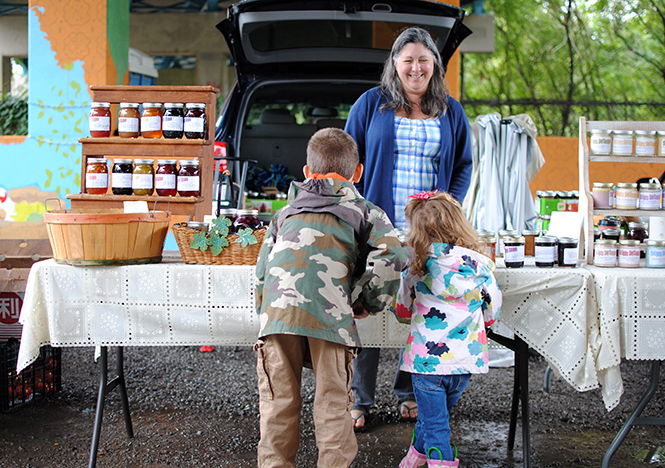Kent City Council discusses possible tax for Haymaker Farmers’ Market vendors
A vendor talks to tiny customers at the Haymaker Farmer’s market, Sept. 8, 2012.
March 31, 2014
The Haymaker Farmers’ Market will return for its 22nd year this summer, but it soon could see an added tax or fee levied against its vendors, according to Kent City Council.
City Council carried a motion to renew the sublease of property — located near the Route 59 Haymaker Overpass — for this year’s Farmers’ Market. But during the discussion, several members of City Council expressed concerns that the vendors who make profits from the market don’t pay any taxes to the city of Kent.
Council member Wayne Wilson was the first to speak up at the council meeting. He said he “doesn’t understand why we would support this.”
“It’s a philosophical thing with me,” Wilson said later. “With other businesses in this town, they pay taxes. We subsidize them with the property, and I feel they should pay taxes like other businesses. It’s not that I’m against the Farmers’ Market, but I think it’s about treating all businesses the same.”
The added tax or fee would be either an income tax based on what each vendor makes or a standard fee to be in the Farmers’ Market. No council member has put any sort of vote or further discussion on the agenda yet.
One of the reasons vendors don’t have to pay taxes on their profits is due to an exception in the city’s laws, which require 12 consecutive days of work to collect income taxes. Since the farmers’ market meets on the weekends, its vendors are exempt.
“Say somebody comes in to pour concrete in Kent, they have to work here 12 days consecutively before they are liable to pay taxes in the city of Kent,” council member Heidi Shaffer said. “This is a discussion about how do we capture the income tax. We’ve been debating this for a couple of years now and that gap, that exception [in the law], is something that’s come up.”
Shaffer agreed that vendors from the market should pay some sort of tax. But she also wonders if going after a tax or fee is worth it in the long run.
“How much is it worth, really? That’s my question to those who actively pursue those who make such little money, people that grow food in Portage County or come to see them,” Shaffer said. “Should they be paying it? In my opinion, yes. Do we want to make an enforcement issue out of it? I don’t believe it’s worth our time… But, these vendors are benefiting. Maybe we should make something back. My argument is that we should make something back, but it’s not tangible.”
Shaffer also noted that the Haymaker Farmers’ Market has other positive qualities, such as the ability to bring more people downtown and that it adds a “quality-of-life” element.
The Farmers’ Market is hoping to do a “Seed Study,” showing the economic effect the market has on the city this summer, while highlighting the number of people who end up downtown and how much money they spend there.
Farmers’ Market manager Kelly Ferry said with a fee or a tax, she “is sure” the market would lose some vendors. She also argued that the market already brings in enough economic positives to the city — something she hopes to prove with this study.
“It’s community building for sure,” Ferry said. “We’re enhancing the local food chain so farmers have a way of making a living. We’re seeing new people every year but the same core group, the same 1,000-2,000 people or so, are still coming and those people stay downtown. They go to the market, they go to restaurants downtown, so [the city of Kent] is already getting taxes from this.”
Ferry said that in years past the Farmers’ Market has not collected information on sales or profits from the market.
Contact Ryan Lewis at [email protected].

























